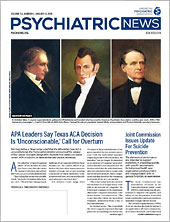International medical graduates (IMGs)—those who have completed their undergraduate medical education in schools outside of the United States—often face challenges with immigration issues and adjusting to U.S. culture. To help smooth their transition, APA has created a new resource for IMGs, “Navigating Psychiatry Residency in the United States: A Guide for International Medical Graduate Physicians,” which can be accessed on APA’s website.
The online guide, written by members of APA’s IMG Caucus, is the culmination of more than six months of information gathering and is broken into four sections:
•
U.S. Medical Education and Training System contains information on the United States Medical Licensing Exam, other aspects of licensure, and Match Day.
•
Languages and Communication provides strategies for improving verbal and nonverbal communication beyond the basics needed for clinical encounters to better foster the physician-patient relationship.
•
Cultural Factors explores the various challenges that working in a different culture can present and offers ways IMGs can come to understand and acclimate themselves to their new communities.
•
Immigration provides information on eligibility and requirements for the H-1B visa and J-1 visa, and contains links to information about visa sponsorships, general psychiatry residency application guidelines, and U.S. immigration services.
Nyapati Rao, M.D., M.S., chair of APA’s IMG Caucus and one of the guide’s authors, noted the challenges that IMGs face.
“IMGs may experience loneliness and social isolation due to cultural differences with the local population. This may result in certain degrees of alienation and other conflicts. Many do not have any connection with the United States, so they will benefit from having a guide that addresses critical issues to help them adapt.”
Moreover, he said, “Literature shows that those IMGs who are bicultural have performed better than their colleagues who have not worked through [challenges in adapting to a new culture]. These issues need to be continuously on the front burner of the field to be helpful to IMGs.”
Vabren Watts, Ph.D., deputy director of APA’s Division of Diversity and Health Equity, said that the guide is one of the steps APA has taken to support and promote minority and underrepresented groups in psychiatry.
“IMG psychiatrists have long expressed a need for APA to develop an educational resource to meet the needs of approximately one-third of psychiatry trainees,” Watts said. “APA listened and acted upon their request. IMG residents now have a tool to help them more quickly adapt to practicing in the United States.” ■
“Navigating Psychiatry Residency in the United States” can be accessed
here.

